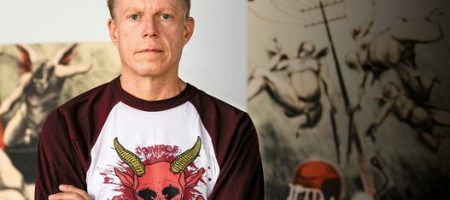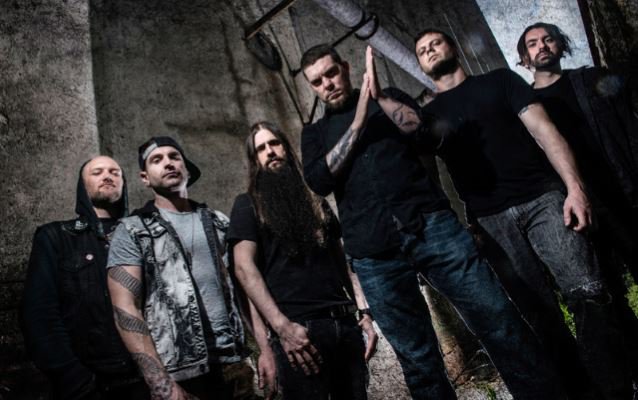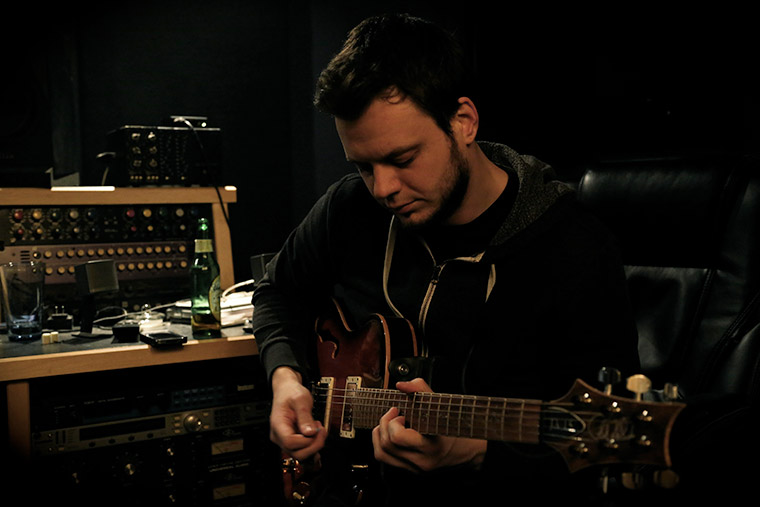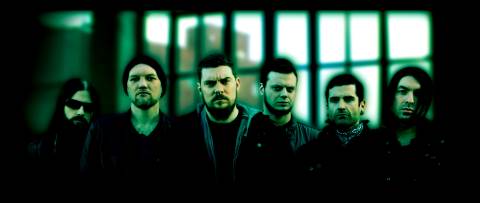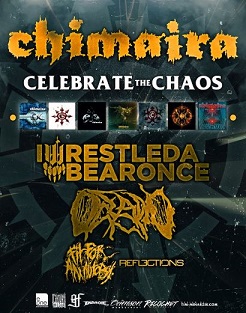Mark Hunter – Down Again
Tuesday, 23rd October 2018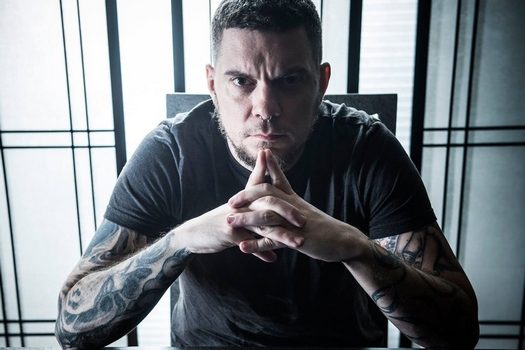
Best known in these parts for his role as the vocalist of Cleveland’s Chimaira, Mark Hunter moved on to other pastures when the band broke up in 2014 after several line-up changes and iterations through the years. Taking up photography as his new ambition, he has now spent a few years in the field and has his own business.
But he hasn’t completely forgotten Chimaira either. The band played a reunion of sorts at the end of last year that saw the majority of the original line-up come together for one final time. During all of this, Hunter sat on a panel for mental health at the Acting Out! Festival, and ended up pairing up with Nick Cavalier (who also directed artist Derek Hess’ documentary) to make a film on the subject. We chatted with Hunter about the Down Again documentary (which is available to view now) and mental health, his work in photography, as well as his thoughts about Chimaira’s final show.
Dead Rhetoric: How were you initially approached about doing the Down Again documentary?
Mark Hunter: Last year there was a suicide, mental health, and addiction awareness festival put on by an artist named Derek Hess called Acting Out! Festival. For that festival, I was a guest speaker on a panel, with Nick Cavalier, who is the director of Down Again, and Dr. Patrick Runnels, who is the therapist that speaks in the film. We did an hour panel discussion with a live audience, and basically just told our stories in front of an ‘expert,’ so to speak. We gave some antidotal evidence, without there being some real evidence to support it/articulate it better than we could. We finished it that day, and Nick grabbed me out of the blue and wanted to grab lunch. He approached me with the idea based off the panel discussion, of doing a film and continuing the conversation – to bring it to a larger audience.
I was a little apprehensive at first because I didn’t find myself to be an interesting candidate, but once he explained that it was more allegorical I started to warm up to the idea. I was interested right away, but I guess it would be anyone’s approach to starting something like this – that hesitance and saying, “I don’t know, let’s just go with it.” It’s a part of saying yes to more things in life, and I’m glad I did, because what ended up happening – Nick and the film crew were able to capture the Chimaira Christmas show, the first one that we had played with that line-up in seven years, and the rekindling of friendships. For me, to have that documented, and documented in amazing quality – I’m very grateful to have been chosen.
Dead Rhetoric: You were on that panel – what made you initially say that you should speak out about mental illness to begin with?
Hunter: The original request from the Acting Out! Festival was for Chimaira to play the event. We had not really announced our return, but we had been preparing for the Christmas show. I knew that we wouldn’t be able to play at Acting Out! Festival. There was something internal that happened, this seemed like a great festival and I still wanted to be a part of it. So I mentioned that I have Hypomania, which is a form of bipolar, and I would love to talk about it if there’s a need. So we couldn’t play, but I could [laughs]. It was as simple as that.
Dead Rhetoric: So what do you want people to take away from the film?
Hunter: I think that it’s interesting for a music fan, or especially a Chimaira fan. They are getting to see the concepts for these lyrics that they love so much and what it is, exactly. If someone is going to tattoo a line on them, I know that it means something to them personally, which is what it is supposed to mean, but they get a chance to see where it’s coming from in a way. But also, more importantly, it shows that there’s a taboo on mental health and mental illness that we are all guys that belong in a straight-jacket with padded walls, but it’s actually a performance enhancer for some of us at times. For myself and Nick, we are gifted with this incredible focus and drive, and if I have an idea and start to go for it, I can work 24 hours and not even blink. It’s almost this superhuman manic energy.
The problem is when you are done with the project is that you get this miserable hangover, which is the best way I can describe it, where you just don’t want to do anything. That’s where I try to find new sources of inspiration, so I might go on YouTube or watch a photographer to a trick that I had never even thought of/heard of, and it gets me out of bed to go try it. It’s basically ups and downs, which everyone experiences, but at a more severe level. But not so severe that I need to be in a straight-jacket. A lot of people have what I have: Steve Jobs, Thomas Edison – it’s a CEO disease it what they call it. I’m not trying to be like Steve Jobs and place myself with all these iconic geniuses [laughs], but it’s not so much of a taboo curse. There are people that it is like that, but there are other sides to the coin, and it’s an important conversation to have.
Dead Rhetoric: How does mental illness impact you on a daily basis?
Hunter: On a daily basis, it’s how am I going to wake up? What side of the spectrum am I waking up on? How is it going to affect my productivity? I might shoot a wedding for a client and I’ll wake up that day and I do feel it. I don’t feel good. I don’t feel great, and I’m forcing myself. I can just tell the whole time – I feel subdued. I’m not myself. I’m distant. I’m not that extroverted, “Hey everybody, big smile!” I can’t even talk to them. I could care less – I want to do the project, but I just don’t want to interact with other humans. It’s great that I have my better half. My girlfriend is very in tune with my personality and the jobs that I do. If I am low, on a very important day where I need to be up, she’s usually up and very friendly. She can do all the talking and getting people excited, and then I don’t have to do as much interaction. When I don’t wake up on the right side and I have to be somewhere, it can be challenging. Here I am in front of hundreds of people that I have never met, and you want to make a good impression and all I want to do is curl up in bed and stare at a wall.
Dead Rhetoric: You mentioned that it can be an enhancement for you as well. In the film this came up too, but how has Chimaira been catharsis for you, personally?
Hunter: Dealing with the hardships of life – I feel like if I’m low, I’m more sensitive to certain issues. If I have something tragic happen, I might get hit a little harder than the average person. For me, with music, in creating it, I’m able to almost beat it out of me and get stronger. If I’m cut, I’m re-callusing it. It’s like playing a guitar and your fingers hurt, but after a while you keep doing it and callus up and it no longer hurts anymore. It’s kind of the same. So if I went through something tragic, by dealing with it over and over again and singing the song every night and going through those emotions, it’s like a callus in a way. It’s still there, but it doesn’t hurt as much. You can deal with it, you are a little more focused and straight-forward and not just wallow in it.
Dead Rhetoric: On the other hand, what are some of the stresses of being in a band that combine with mental illness that people don’t have an understanding of?
Hunter: Of course, there’s traveling and being away from family/loved ones. It’s hard for anybody, but with that extra sensitivity, it hurts a little more. You miss birthdays, weddings, anniversaries, funerals – it weighs heavily on you. If finances are not well, which it is for a lot of metal bands, and you are experiencing a lull – we went through the financial crisis and we went through 2012 where gas was almost $5 a gallon and we are trying to fill-up on diesel. We are booked to go from Seattle to Los Angeles and there’s nothing in between. It cost us more to drive there than we will get paid. Those sort of things compact on top of one another. It will callus you up and make you tough, but some days you aren’t getting out of your bunk until you go and play. Then you play and belt it all out. You are still pissed and low.
Dead Rhetoric: One of the other things that caught my ear in the film had to do with spelling – ‘casting a spell’ – could you talk about how that impacted your music and writing lyrics?
Hunter: I’m being very literal there. I think that it is what it is – that’s the origin of the word, I could be wrong, but from studying it I thought it was fascinating. People, especially in my neighborhood, they still hold the Bible as truth. All these words are truth, and if you are not religious, it’s like looking at all of those people having a spell cast on them. Someone wrote words down, and people believe it and do with it what they will. I think in my sense, I was being very literal, so I decided that once I learned that – I’m kind of a weirdo and like to study ancient history. I found it fascinating and it made me a little more careful and in tune with writing instead of being just angst-y and “I hate everyone.” That’s not true, I don’t think I hate anyone in real life [laughs].
Dead Rhetoric: Moving past the band, how has photography channeled a different sort of creativity for you?
Hunter: It enables me to be extremely prolific. With music, especially in the beginning before all this technology came about, was you write an album and then you have to tour for it for 2 years. So there isn’t much creativity happening. With photography, I can be creative whenever I feel like it. I don’t even have to have my camera on me. You always have your phone in your pocket now. I’m able to be very prolific, and I’m able to expand genres. Meaning that if I’m a metal guy, everyone that knows me knows I love rap but they aren’t going to hear me make a rap song, because I know that’s going to upset my genre. But metalheads don’t mind it if I post a picture of a flower. They might not double-tap it on Instagram, but maybe someone else will. They aren’t going to be mad at me [laughs]. I haven’t broken a cardinal, heavy metal sin. It enables me, as a human being with my art, reach different types of audiences. People that like my photography would never listen to my band, or have any interest in the creativity that provides for people, so it’s cool.
Dead Rhetoric: Where there things that you learned from the music business that you have applied to photography?
Hunter: Everything. The importance of quality images – I was the guy in the band that worked with the photographers and videographers in presenting visions. I was the guy back in the day, when we would get pages and pages of tiny photos to approve, and we would have to look through a magnifying glass to pick which promo shots we were going to use, I was the guy who picked all the photos. My interest in it comes from movies – I’m more of a movie buff than a music guy any day of the week. So I just had a natural eye for it I guess. When it came to running a business, that’s what I see around here, living in a smaller and more rural area. People might have a great business, but they have no social media, their photos are horrible, and their website is crap. Anything and everything that we know as bands as being important, because someone in Croatia needs to be able to find us and it needs to look good to someone in England, and they need to find it easily. Everything needs to have a continuity, feel, and vibe. Everything needs to function correctly for our brand. I don’t see how that’s any different for a business. Basically everything I learned from my band goes into my photography business.
Dead Rhetoric: What was it like to get back on stage with Chimaira last year for the one reunion show?
Hunter: It was amazing. We spent about a year and a half after all was said in done in putting it together from the initial idea to standing on stage. First it was intimidation of rekindling friendships, first and foremost, and I had to take steps to do that. Once we got past that phase, and everyone was interested in doing the show, it became more about the production. How were we going to do this or that, what songs were we going to play, how were we going to put it all together, what kind of production where we going to have? So it was an amazing experience putting it together, but the most important part was to rekindle our friendships, so that by the time we stood on stage – it would have sucked if we didn’t do that first.
I can’t imagine playing that show and looking to my left or right and having bad blood between us. It wouldn’t have been a good vibe. Because it was more of a reunion show, and not going out on the bad note we went out on initially, it didn’t really spark an interest in doing it right away again. We were offered it, and everyone was kind of gung-ho, but we thought about it and we didn’t have a reason to. If we do it again next time, or if we ever do something again, we want a little more time to pass or a bigger reason to do it. Not like, “Hey, it’s been a while, let’s just go do it again.”
Dead Rhetoric: So it was almost a sense of closure that it captured then.
Hunter: It was. That felt like the closure we needed. I think a few of us wouldn’t mind playing a few shows in the future, or making a song here or there, but everyone has to be on the same page. Until everyone is on that ‘excited to move forward’ page, it will just stay where it’s at.
Dead Rhetoric: You have the documentary and photography, what else do you have going on at the moment?
Hunter: Interestingly enough, starting a successful photography business in a rural town isn’t the quickest way to put money in your bank account. So I do part time work as a funeral assistant. I figured that was a pretty heavy metal job to be around dead bodies all the time. I think it’s a fascinating industry to be a part of, because I’m extremely anonymous but I’m doing one of the most important jobs there is. It’s totally surreal. I enjoy it, but it has some gruesome days.
Down Again documentary official website
Mark Hunter Photography official website
Chimaira on Facebook











